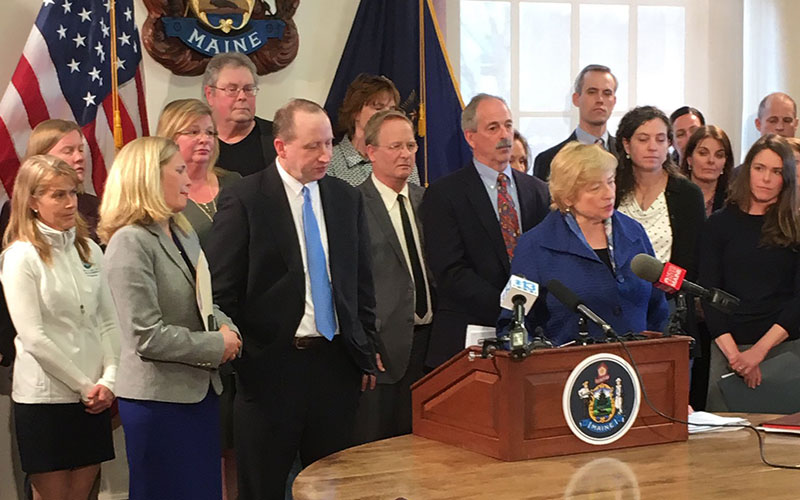
Maine businesses including farmers, fishermen, and energy companies joined lawmakers from both parties, cabinet members, and climate advocates Governor Mills’s announcement of her sweeping climate bill.
Maine just took a big step forward on climate. Last week, Governor Janet Mills announced a bill that could make significant progress toward addressing our climate crisis by drastically reducing climate-damaging emissions while growing our state’s economy.
The bill sets mandatory targets for cutting our state’s carbon emissions, establishes a plan to get us there, and creates a climate council to oversee the planning. In doing so, it incorporates many features of the pending climate bill that CLF and our allies have been pushing for since the election last November.
Maine is already experiencing the devastating effects of climate change, from warming waters in the Gulf of Maine harming our fishing industries to higher temperatures increasing tick populations and worsening allergies. Everyone in Maine is at risk, which is why such a diverse crowd – including fishermen, farmers, and small business owners, as well as CLF and our allies – stood with Governor Mills when she introduced the bill.
The only way to fight back against these economic, health, and environmental impacts is to ditch fossil fuels and drastically lower our polluting emissions – and soon. Now, with the strong climate leadership of Governor Mills and the Maine legislature, we can get there from here.
A Roadmap for Maine’s Future
The governor’s climate bill, “An Act to Establish the Maine Climate Change Council to Assist Maine to Mitigate, Prepare For and Adapt to Climate Change,” creates a roadmap for reducing the state’s climate-damaging emissions. For any roadmap to be useful, of course, you need first to know where you’re going.
The bill sets the State’s destination by establishing emission levels that Maine must meet. It requires an 80 percent reduction below 1990 emissions levels by 2050, with an interim 45 percent cut by 2030. These targets are consistent with those that garnered bipartisan support in a bill CLF and our partners have prioritized since last fall (LD 797).
Having a long-term roadmap – with enforceable emissions targets – is critical to stimulating economic growth and development while we transition Maine off of climate-damaging fossil fuels (as the most recent science says we must do to avert catastrophic climate impacts). This long-term vision will stimulate timely and pragmatic planning for this transition. Mandatory targets also ensure that State decisions are made under a framework that requires consideration of climate change impacts.
Bill Sets the Destination and Creates a Plan for How to Reach It
A good roadmap needs to do more than identify your destination – it needs to show you how to get there, as well. The governor’s bill, like LD 797, would identify pathways to reach our emissions targets by updating the state’s current (and aging) climate action plan with input from Mainers. The bill requires the planning process to consider a variety of important factors in developing these pathways – such as technological feasibility, equity, job creation, and impacts on the environment. It also recognizes that we must deal with the climate impacts we can’t avoid by requiring the development of a plan for climate adaptation to protect our infrastructure and communities.
New Climate Council Will Oversee Planning Process
The governor’s climate bill also would establish a new commission to develop the climate action and adaptation plans. The “Maine Climate Change Council” would be comprised of top government officials as well as representatives of state interests like Maine’s tribes, environmentalists, youth, and organized labor, to name a few. A scientific and technical subcommittee would take a hard look at climate change impacts on the state, including our coastlines and oceans. Several working groups also would be created to home in on key issues, such as how to cut carbon pollution from transportation and buildings.
Governor Mills’s Bill Marks Exciting Progress, but There’s More Work to Do
There’s a lot to be excited about in Governor Mills’s climate bill. Indeed, it contains ideas that CLF helped establish in Massachusetts under that state’s Global Warming Solutions Act and that we are pursuing in each of our home states this spring.
That said, as with most complex policies, the devil is in the details. To belabor the roadmap analogy just a little bit further (bear with me!), it is undoubtedly critical to know where we’re going, the path to get there, and who’s in charge of creating the map. But . . . and this is a big but . . . all the planning in the world won’t get us there unless the State follows the roadmap.
It would be a shame to go through the thorough, inclusive processes outlined in this bill and develop a comprehensive plan full of good ideas if there’s no way to ensure that it gets implemented. And here’s where we think there’s a bit more work to be done – we agree with the concept of the bill, but we want to make sure it all comes to fruition.
That’s why you’ll find us at the Legislature and continuing to work with the Mills administration on this bill, which is full of promise for Maine’s future.
You can help us move this bill forward. Be sure you’re signed up for our email list to get alerted on its progress and when you can make your voice heard.



